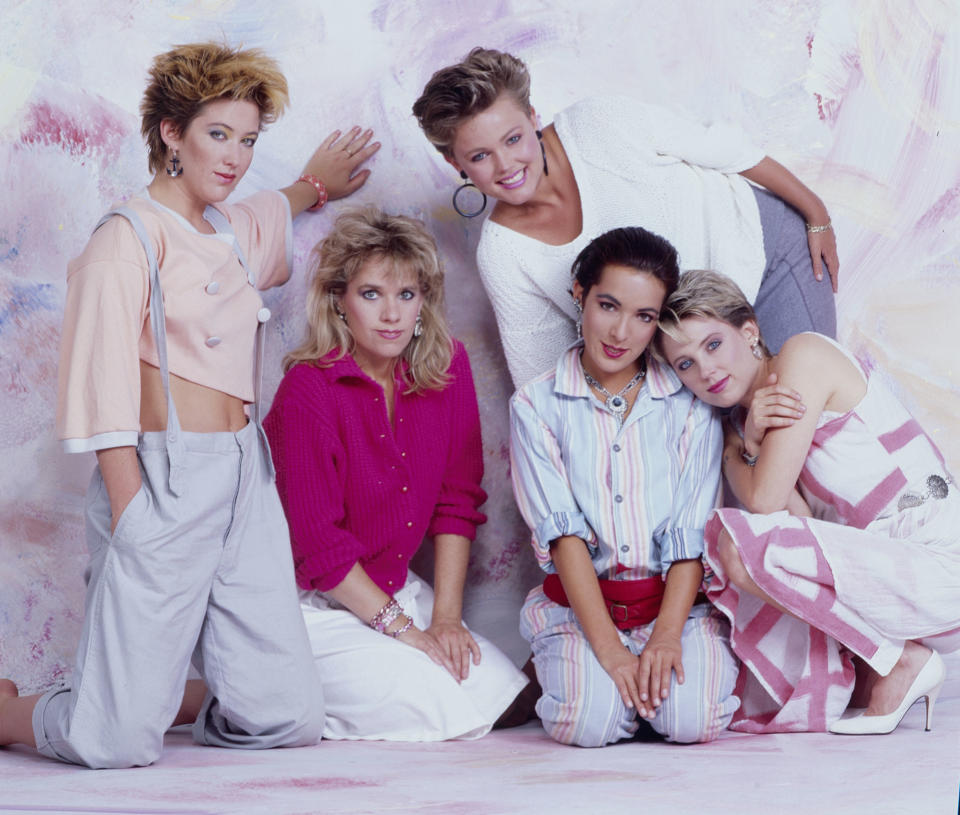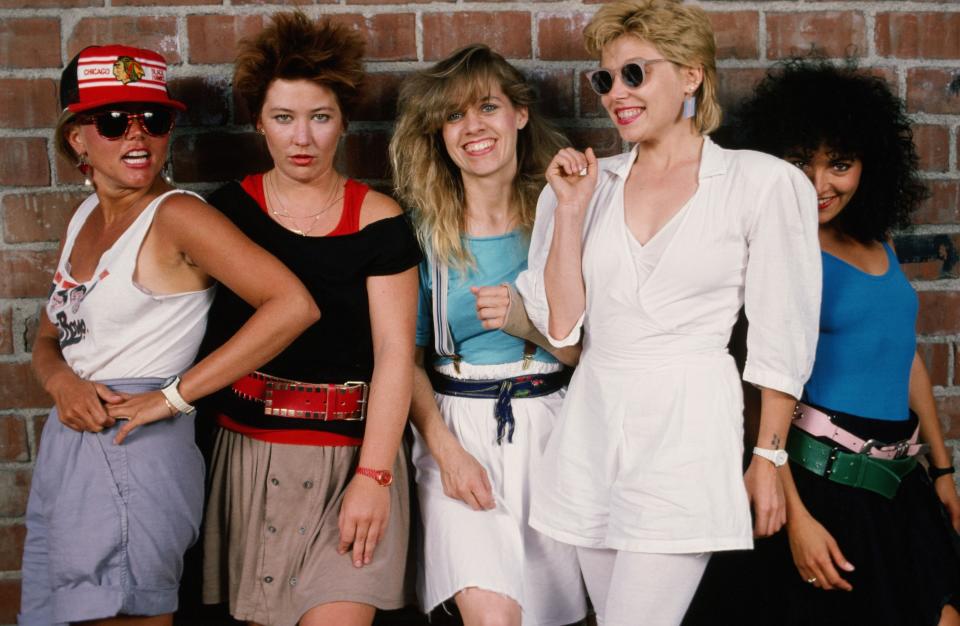The Go-Go's talk partying past, Hall of Fame snub, and 'emotional' documentary: 'You can't deny what we've done'
In March 1982, the Go-Go’s’ debut album Beauty and the Beat made history by being the first album (and, nearly three decades later, the only album) by an all-female band that wrote all their songs and played all their instruments to go to No. 1 on the Billboard 200; it held that top spot for six straight weeks.
The band’s frontwoman Belinda Carlisle and guitarist Charlotte Caffey remember exactly where they were when they heard the news — delivered personally by Sting, who came bearing a bottle of champagne. Newly signed to IRS Records, the Go-Go’s were on tour with that label’s premiere group, the Police, whose own album had charted that week at No. 6. Ironically, only a couple years earlier, even though the Go-Go’s were one of the top-drawing bands in Los Angeles, every major label had passed on them.
“We were told, ‘We love you. We can see that everybody loves you, but there's never been an all-female band that has been big. I mean, you've had cult-level successes, like the Runaways and Fanny, but as far as having a big chance of success note, because you're all women, there's never been anything before, you know, like you, so I'm sorry, we'll pass,’” recalls Carlisle, speaking to Yahoo Entertainment about the band’s new career-spanning Showtime documentary, The Go-Go’s, premiering July 31. “Ginger [Canzoneri], our manager, says she has a file full of rejection letters for that very reason.”
“I would love to read all those letters,” Caffey laughs. “It'd be so fun,”
Caffey admits that “looking back, it's very vindicating” to prove all those doubting A&R reps wrong, but at the time, she and Carlisle’s bandmates (guitarist Jane Wiedlin, bassist Kathy Valentine, and drummer Gina Schock) barely even had to time to realize what they had achieved, due to their “nonstop work, but also nonstop partying.”
The Go-Go’s may have had a squeaky-clean pop-girl image, but in reality they were as debauched as any other band to come from the Hollywood punk scene ““We make fun of it all the time: ‘Oh, the Go-Go’s — cute, bubbly, effervescent, America's sweethearts!’” Carlisle laughs. “It was really like one big party all the time. … Of course, it turned dark, but not for a while.”
Caffey says it was when the Go-Go’s performed on Saturday Night Live in November 1981 that she first realized that the band was on its way to the big leagues; the exposure played a big part in Beauty and the Beat’s slow-burning success, with album finally going to No. 1 four months after the SNL appearance and eight months after its initial release. However, as revealed in the Showtime documentary, the disastrous performance could have been a career-killer, because the Go-Go’s were so intoxicated at the time that they barely muddled through.
November 14, 1981.
Saturday Night Live.
We might or might not have had a couple (no really) of drinks before the show. We performed OLAS and WGTB.
📸Al Levine pic.twitter.com/S3ZcDVQYwA— The Go-Go's (@officialgogos) July 13, 2018
“At the time, it was scandalous,” says Carlisle. “Everybody, that was the talk. It was like: ‘Did you see the Go-Go's performance? Oh my God, they were out of it!’ But I don't think we were; I don't think it was that bad.”
“It's actually not as bad as we remember — if we remember, because that day was a lost day,” Caffey chuckles. “We started drinking early, and then someone brought some coke and it was like, you know, you're trying to even it out. And then all of a sudden they're like, ‘OK, you're going on, girls! Remember, you're playing in front of 50 million people!’ “And we were like, ‘Oh no!’ … You can see the terror on my face [in the SNL footage], because I'm like, ‘F***!’” (The infamous performance begins at the three-minute mark here.)
The Go-Go’s can look back at their hard-partying early days or even the SNL debacle with amusement, but as Carlisle said, their drug use eventually took a less “celebratory” turn. Caffey in particular went to a very dark place (to put in perspective, at the Rock in Rio festival, she was so high, she got kicked of Ozzy Osbourne’s dressing room), developing a “full-blown heroin addiction.” However, she not only managed to hide this from the press, which was still playing up the group’s girl-next door image, but she tried to hide it from her fellow Go-Go’s as well.

“I knew I was in trouble, but I didn't know how to talk about it. and I didn't want to let the girls down, so I would lie, really just trying to wish it away. And I couldn't control it,” Caffey says.
“We knew it was going on, but there's nothing much you can do,” says Carlisle. “But you know, sunglasses would come out, and they're like telltale signs.”
Fortunately, Caffey checked herself into rehab shortly after the Ozzy incident, and she has been clean. ever since — for 35 years. But her sobriety, along with Wiedlin’s departure, contributed to the end of the Go-Go’s in 1985.
“Now I’m glad, because I was writing really sh**ty songs. I’m going to be real honest about that. It was not happening,” says Caffey. “And, also personally, I was two or three months sober when we left the band, and I had to choose myself for the first time. Like, I had to not choose the band, because I really knew deep inside if I didn't do this, I was going to die. I wasn't going to be able to survive, because there was a lot of crap going on. We never really resolved stuff. We've learned how since, but not back then. And there was never a time when would we have had time to resolve anything, because we were nonstop going for like, seven years.”
“I think that I lacked a lot of empathy back then and wasn't as kind as I could have been,” Carlisle admits of the band’s final days recording their troubled third album Talk Show, which she says is the hardest part of the documentary for her to watch. “I didn't participate, yet I wanted all the rewards. I didn’t participate as much as I should have been, because I was pretty out to lunch. I was devoid of empathy. It's something that maybe that you develop as you get older and have life experiences. It was an amazing, amazing time, and I don't know, it's kind of damaging at the same time. Having that kind of success is really difficult to handle, and you just kind of go crazy. So I don’t think anybody was their kindest self during that period.”

The Go-Go’s reunited in ‘90s and have intermittently recorded and performed ever since; they’re definitely enjoying a renaissance right now, thanks not only to the documentary and their jukebox musical Head Over Heels, but also their first new song since 2001, “Club Zero.” (As for whether there will be more new music coming, Caffey quips, “We do everything in 20-year [increments]. You never know with this bunch.”) Caffey describes The Go-Go’s, directed by Alison Ellwood, as an “incredible story” that was extremely “healing” for her to watch, and Carlisle says, “When I saw it, it really made me emotional. I mean, that's our life, and really seeing it up there, it's just the most incredible experience. I’m really, really proud of it.”
With all of these new accolades and accomplishments, it seems like the time is right for the Go-Go’s to finally enter the Rock & Roll Hall of Fame. In fact, The Go-Go’s ends with the Police’s Stewart Copeland ranting, ‘What the f***?’ over the fact that they’ve never even been nominated. And Carlisle — who in film semi-jokes that they’ve been snubbed because they once complained to Hall co-founder/Rolling Stone magnate Jann Wenner about their sexist Rolling Stone cover — definitely shares that attitude.
“First of all, I don't think any of us really feel we need to be validated by them, no matter what. So we don't sit around and talk about it and think about it. But I do think that they don't like us,” says Carlisle. “Which is fine, you don't have to like the music, but you can't really dispute the fact that we were the first of our kind. We put ourselves together. We wrote our own songs. We played our own instruments. We came from absolutely nothing. We came out of the garage. We had 100 percent artistic control. We had one of the first male or female debut albums to be No. 1. I mean, that doesn't happen so often; I think maybe 20 artists have had that in the history of music, something ridiculous like that.
“So, I just think it's a personal thing, which is silly because at the end of the day, it's about innovative artists and it's about innovative acts like the B-52’s or Suzy Quatro or Cher. There's so many that are innovators and not just frat-rock guys that get in,” Carlisle continues, getting worked up. “I mean, I get the ballot every year, and I just look at it and go, ‘Are you kidding me?’ I don't even know why they send me a ballot. They know how I feel. But I just write in ‘Go-Go's,’ check it off, and send it back.”
When asked who’d they want to give the Hall induction speech if the Go-Go’s were to get in, Caffey suggests Patti Smith, and Carlisle says Debbie Harry. But Carlisle reveals that she’d probably skip the ceremony altogether. “I don't think I would show up now. I don't go in for the corporate thing. I think it's too little, too late, actually,” she says. “I do think it's personal. I know for a fact that there are quite a few people that don't like us on the panel, whatever they are. That's fine. You can't deny what we've done. I'm not saying that in an arrogant way. I'm just stating facts.”
Get all the facts when The Go-Go’s premieres on Showtime this Friday, and check out Carlisle and Caffey’s full, extended Yahoo Entertainment interview below, in which they dish about their L.A. punk beginnings, getting spit upon by London punks on their scary first U.K. tour, their infamous night at the 1982 Grammy Awards, fashion do’s and don’ts, and much, much more:
Read more from Yahoo Entertainment:
Salt-N-Pepa on their very necessary legacy: ‘We were always underestimated in the industry’
Margaret Cho opens up about how the Go-Go’s changed her life
Suzi Quatro talks Rock & Roll Hall of Fame snub: 'It's just plain stupid'
The lost story of female rock pioneers Fanny: 'Society was not ready to accept us'
Josie Cotton talks lost 1986 album, 'Valley Girl,' and getting asked out by Nicolas Cage
Follow Lyndsey on Facebook, Twitter, Instagram, Amazon and Spotify.

